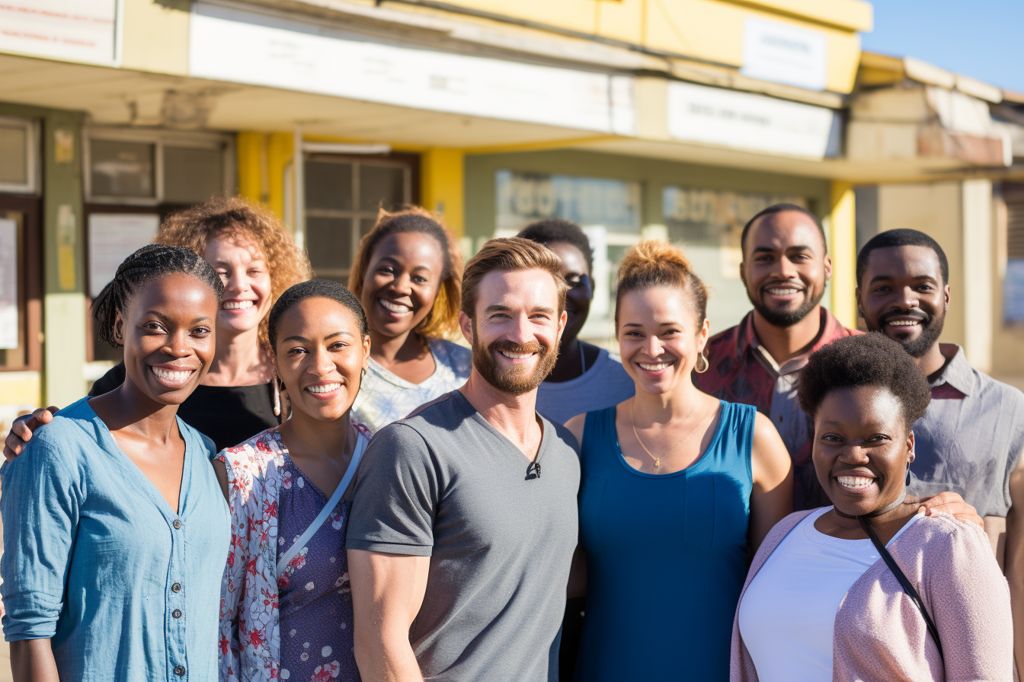South Africa’s Thutsa Lerole Initiative, under the guidance of Deputy President Paul Mashatile, aims to expedite service delivery and enhance the lives of countless South Africans. The programme follows the District Development Model (DDM), a government strategy to tackle service delivery obstacles through effective collaboration across various government levels. Thutsa Lerole’s primary objective is generating jobs and enhancing service delivery, with intervention in sectors such as housing, education, healthcare, fundamental infrastructure, and public safety to guarantee every individual, irrespective of their financial situation, can access high-quality services.
Aligning with District Development Model for Efficient Coordination
South Africa is striving to overcome hurdles in service delivery, an issue of utmost importance to Deputy President Paul Mashatile. Under his guidance, the nation has launched a pioneering intervention called Thutsa Lerole, devised to expedite service delivery and enhance the lives of countless South Africans.
The Thutsa Lerole Accelerated Service Delivery Programme follows the District Development Model (DDM), a government strategy created to tackle service delivery obstacles through effective collaboration across various government levels. The DDM fosters partnerships between local municipalities, provincial governments, and the national government, enabling them to organize, allocate funds, and execute projects and programs more effectively.
Prioritizing Job Creation and Improved Service Delivery
A primary objective of the Thutsa Lerole Programme is generating jobs and enhancing service delivery. It adheres to the principles of “Batho Pele,” meaning “people first,” highlighting the significance of delivering top-notch services to South Africa’s citizens. The program’s primary intervention sectors include housing, education, healthcare, and fundamental infrastructure.
In terms of housing, the ANC government has committed to providing suitable housing for millions of South Africans residing in informal settlements through efforts like the Breaking New Ground (BNG) housing policy. Despite delivering over three million housing opportunities, a substantial number of families continue to live in subpar conditions, emphasizing the ongoing housing backlog requiring attention.
Education is another key area for the South African government. Their dedication to enhancing education quality and attaining universal access and equal opportunities for everyone has resulted in policies such as no-fee schools, expanded early childhood development programs, and the offering of school meals. Additionally, the government is adopting digital technology in education through e-learning platforms and distance education programs to overcome spatial and social obstacles.
Ensuring Quality Healthcare and Infrastructure Development
Healthcare is a crucial aspect for the government, with the aim to provide accessible and top-quality healthcare to all South Africans through the National Health Insurance (NHI) scheme. Although NHI’s introduction has been slow, the government persists in working towards guaranteeing that every individual, irrespective of their financial situation, can access high-quality healthcare services.
Furthermore, enhancing infrastructure is a vital component in accelerating service delivery. The ANC government is investing trillions of Rand in reviving and maintaining the nation’s critical infrastructure, thereby promoting economic growth and social mobility for its population. One prime example of these endeavors is the Ba-Ga Mothibi Community Health Centre, a top-notch facility that ranks among the best in Africa.
The Thutsa Lerole Programme also underscores the significance of public safety, comprising prompt responses to emergencies, effective disaster management, and strong law enforcement. By adopting advanced technologies and employing highly trained staff, the government aspires to significantly improve response times and reduce the harm caused by emergencies.
Collaborating for a Brighter Future
Fast-tracked service delivery, as imagined by the Thutsa Lerole Programme, is not a luxury; it is a necessity and a human right enshrined in South Africa’s Constitution. It is fundamental to unleashing the full potential of communities and securing a more prosperous future for generations to follow.
To accomplish this lofty objective, the government, private sector entities, and civil society must collaborate to identify and address the main challenges in service delivery. Cooperation, innovation, and investment in technology and infrastructure are crucial to establish a sturdy ecosystem that supports accelerated service delivery.
In the spirit of Thuntsha Lerole and Batho Pele, let us all dedicate ourselves to constructing a society in which efficient and prompt services are the standard, and every person has equal access to essential services and an equal voice in governing and servicing their community.
1. What is the Thutsa Lerole Initiative?
The Thutsa Lerole Initiative is a programme launched by South Africa’s Deputy President Paul Mashatile to expedite service delivery and enhance the lives of South Africans.
2. What is the District Development Model (DDM)?
The District Development Model (DDM) is a government strategy created to tackle service delivery obstacles through effective collaboration across various government levels. It fosters partnerships between local municipalities, provincial governments, and the national government, enabling them to organize, allocate funds, and execute projects and programs more effectively.
3. What is the primary objective of the Thutsa Lerole Programme?
The primary objective of the Thutsa Lerole Programme is generating jobs and enhancing service delivery, with intervention in sectors such as housing, education, healthcare, fundamental infrastructure, and public safety to guarantee every individual, irrespective of their financial situation, can access high-quality services.
4. What are the key intervention sectors for Thutsa Lerole Programme?
The key intervention sectors for Thutsa Lerole Programme are housing, education, healthcare, fundamental infrastructure, and public safety.
5. What is the National Health Insurance (NHI) scheme?
The National Health Insurance (NHI) scheme is a South African government initiative that aims to provide accessible and top-quality healthcare to all South Africans.
6. What is the significance of public safety in the Thutsa Lerole Programme?
The Thutsa Lerole Programme emphasizes the significance of public safety, comprising prompt responses to emergencies, effective disaster management, and strong law enforcement. The government aspires to significantly improve response times and reduce the harm caused by emergencies by adopting advanced technologies and employing highly trained staff.
7. How can collaboration help accelerate service delivery?
Collaboration between the government, private sector entities, and civil society can help identify and address the main challenges in service delivery. Cooperation, innovation, and investment in technology and infrastructure are crucial to establish a sturdy ecosystem that supports accelerated service delivery.
8. What is the “Batho Pele” principle?
The “Batho Pele” principle is a South African government policy that means “people first” and highlights the significance of delivering top-notch services to South Africa’s citizens. The Thutsa Lerole Programme adheres to this principle.








